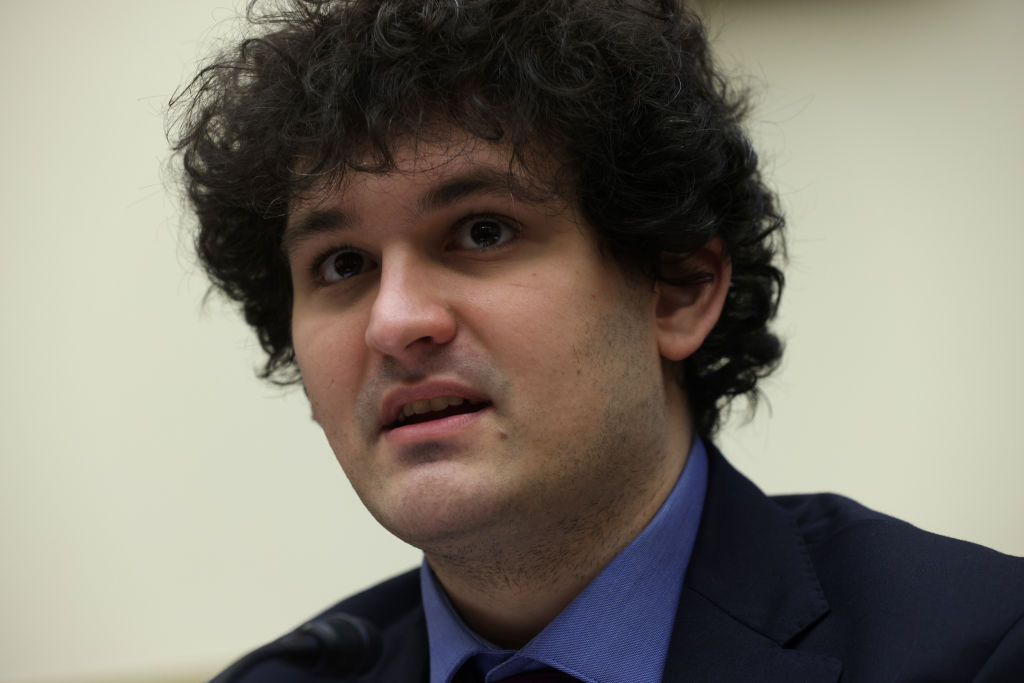Spare a thought for Miami nightclub owners. In recent years, they rode the cryptocurrency wave, raking it in by catering to the fragile egos of geeky crypto bros eager to flaunt their newfound wealth. Now, in the midst of the cryptocrash, business has slowed dramatically.
“Out of the blue, all these kids from crypto started coming down and spending a lot of money — like, an insane amount of money,” one of the city’s nightlife impresarios told the Financial Times recently. Now, he said, they have “completely disappeared.”
If empty nightclub tables in South Beach are an amusing but indirect indicator of the crypto slowdown, a more immediate warning sign was the spectacular implosion of FTX, the world’s largest cryptocurrency exchange, late last year. Before his downfall, the firm’s founder Sam Bankman-Fried had been held up as a patron saint of woke capitalism. He recruited some of the biggest names in sports and entertainment — from Gisele Bündchen and Tom Brady to Larry David and Steph Curry — to boost his brand. Now he looks like little more than a con man.
In many respects, the FTX saga looks like a self-contained tale of greed, dishonesty and, quite possibly, criminal fraudulence. But the rise and fall of FTX is also part of a bigger story. Scam artists have been drawn to bubbles for as long as they’ve existed; when they burst, the jig is very often up for the swindlers. So it is with crypto and Bankman-Fried. And that bursting bubble tells an even bigger story; in fact the cacophonous collapse of FTX is the soundtrack of one economic era giving way to another.
;768:[300×250,336×280,320×100];0:[300×250,320×100,320×50]”]Last summer, a time when pliant financial journalists hung on his every word, Bankman-Fried blamed the Fed for driving down the price of digital currencies. He was right, of course. The crypto boom was a product of an unprecedented era of cheap money. When loose monetary policy combined with pandemic-era fiscal stimulus, crypto soared. When the disastrous consequences of those policies became clear, and Federal Reserve Chairman Jay Powell decided to do something about it, crypto crashed. Then the scammers were found out.
Cheap money discourages scrutiny and breeds gullibility. And, as Bankman-Fried’s rise and fall demonstrates, credulity is not limited to investment decisions. Central to Bankman-Fried’s swindle was a bet that if he cultivated a reputation as an “effective altruist,” wrote big checks to Democrats and presented himself to Washington as the grown-up who wanted to help them regulate the boisterous world of crypto, he could evade scrutiny and write the rules to suit his scheme.
As Leighton Woodhouse reports on page 10, there’s nothing new about this kind of reputation-laundering — though the effective altruists’ self-justifications are even more sanctimonious than those of a previous generations of superrich donors. In Bankman-Fried’s case, it almost worked. And even after his downfall, many media outlets — including some he had invested in — treated him far more gently than he deserved.
Tough economic times are certainly nothing to celebrate. 2022 was an awful year for investors, and rising prices mean Americans are getting poorer. With inflation still high and a near universal expectation of recession this year, millions of Americans are set to suffer for the mistakes of others. If it’s possible to spy a silver lining, though, it’s that the end of the era of free money has brought with it a healthy skepticism and rigor that has often been missing in recent years.
You see it in the collapse in value of NFTs; in the fact that “meme stocks” seem like a distant memory; and in Elon Musk’s entirely reasonable request that Twitter’s workforce either show up for work or accept a payout. As Oliver Wiseman explains, you also see it in the fresh scrutiny the ESG investing craze now faces. Much like Bankman-Fried’s cryptophilanthropy evangelism, ESG boosters present a win-win promise that you can get rich and save the world. The message might sound too good to be true when the going is good. When the going gets tough, though, it becomes demonstrably false.
;768:[300×250,336×280,320×100];0:[300×250,320×100,320×50]”]The era of free money may have propped up loss-making tech companies, meaning all of us could enjoy subsidized taxi rides and cheaper-than-they-should-be food delivery services. It also led to genuinely useful innovations; low interest rates underpinned the shale boom, for example. But it also allowed all kinds of sloppy thinking and bad ideas to be taken far more seriously than they ever deserved. Now that the era has given way to tougher times, at least allow yourself to indulge in some schadenfreude when the biggest hucksters fall the hardest. And take some reassurance from the evidence that the laws of economic gravity do still apply after all.
This article was originally published in The Spectator’s January 2023 World edition.

























